高考英语句子成分分析
句子成分分析
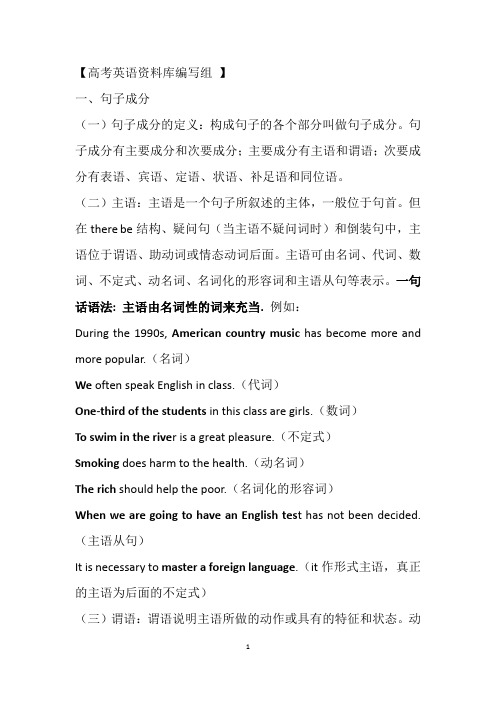
【高考英语资料库编写组】一、句子成分(一)句子成分的定义:构成句子的各个部分叫做句子成分。
句子成分有主要成分和次要成分;主要成分有主语和谓语;次要成分有表语、宾语、定语、状语、补足语和同位语。
(二)主语:主语是一个句子所叙述的主体,一般位于句首。
但在there be结构、疑问句(当主语不疑问词时)和倒装句中,主语位于谓语、助动词或情态动词后面。
主语可由名词、代词、数词、不定式、动名词、名词化的形容词和主语从句等表示。
一句话语法: 主语由名词性的词来充当. 例如:During the 1990s, American country music has become more and more popular.(名词)We often speak English in class.(代词)One-third of the students in this class are girls.(数词)To swim in the rive r is a great pleasure.(不定式)Smoking does harm to the health.(动名词)The rich should help the poor.(名词化的形容词)When we are going to have an English tes t has not been decided.(主语从句)It is necessary to master a foreign language.(it作形式主语,真正的主语为后面的不定式)(三)谓语:谓语说明主语所做的动作或具有的特征和状态。
动词在句中作谓语,一般放在主语之后。
一句话语法: 谓语由动词充当. 有很多同学在写作的时候容易犯的错误就是要么乱用be 动词,要么句子没有谓语动词. 谓语的构成如下:1、简单谓语:由一个动词或动词短语构成。
如:He practices running every morning.2、复合谓语:(1)由情态动词或其他助动词加动词原形构成。
高考英语语法句子成分分析
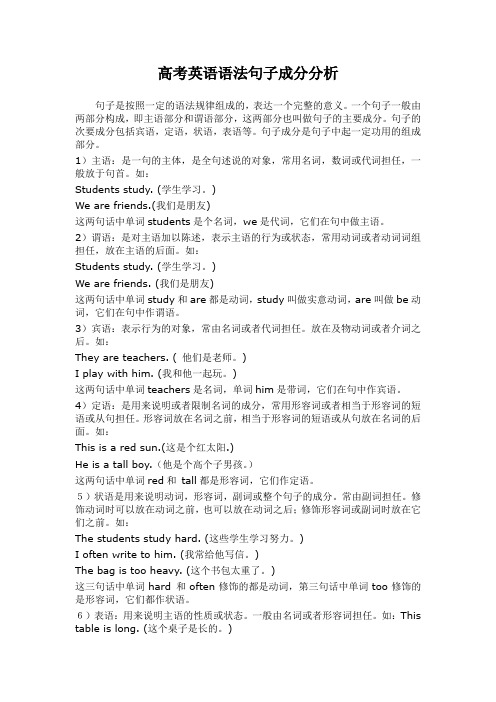
高考英语语法句子成分分析句子是按照一定的语法规律组成的,表达一个完整的意义。
一个句子一般由两部分构成,即主语部分和谓语部分,这两部分也叫做句子的主要成分。
句子的次要成分包括宾语,定语,状语,表语等。
句子成分是句子中起一定功用的组成部分。
1)主语:是一句的主体,是全句述说的对象,常用名词,数词或代词担任,一般放于句首。
如:Students study. (学生学习。
)We are friends.(我们是朋友)这两句话中单词students是个名词,we是代词,它们在句中做主语。
2)谓语:是对主语加以陈述,表示主语的行为或状态,常用动词或者动词词组担任,放在主语的后面。
如:Students study. (学生学习。
)We are friends. (我们是朋友)这两句话中单词study和are都是动词,study叫做实意动词,are叫做be动词,它们在句中作谓语。
3)宾语:表示行为的对象,常由名词或者代词担任。
放在及物动词或者介词之后。
如:They are teachers. ( 他们是老师。
)I play with him. (我和他一起玩。
)这两句话中单词teachers是名词,单词him是带词,它们在句中作宾语。
4)定语:是用来说明或者限制名词的成分,常用形容词或者相当于形容词的短语或从句担任。
形容词放在名词之前,相当于形容词的短语或从句放在名词的后面。
如:This is a red sun.(这是个红太阳.)He is a tall boy.(他是个高个子男孩。
)这两句话中单词red和tall都是形容词,它们作定语。
5)状语是用来说明动词,形容词,副词或整个句子的成分。
常由副词担任。
修饰动词时可以放在动词之前,也可以放在动词之后;修饰形容词或副词时放在它们之前。
如:The students study hard. (这些学生学习努力。
)I often write to him. (我常给他写信。
考点01 英语句子成分及基本结构(解析版).pdf

考点01 英语句子成分及基本结构一、【知识精讲】句子成分(一)句子成分的定义组成句子的各个部分叫做句子成分。
通常有主语、谓语、宾语、表语、定语、状语、补语、同位语等。
(二)句子的具体成分1. 主语(subject)主语是一个句子所叙述的主体,一般位于句首。
但在there be结构、疑问句(当主语不是疑问词时)和倒装句中,主语位于谓语、助动词或情态动词后面。
主语一般由名词、代词、数词、不定式、动名词和主语从句等充当。
(1) During the 1990s, American country music has become more and more popular.(主语为名词)(2) We often speak English in class.(主语为代词)(3) One-third of the students in this class are girls.(主语为数词)(4) To swim in the river is a great pleasure.(主语为不定式)(5) Smoking does harm to the health.(主语为动名词)(6) When we are going to have an English test has not been decided.(主语为从句)(7) It is necessary to master a foreign language.(it作形式主语,真正的主语为后面的不定式)2. 谓语(predicate)谓语说明主语所做的动作或具有的特征和状态。
动词在句中作谓语,一般放在主语之后。
谓语的组成如下:(1) 简单谓语:由一个动词或动词短语组成。
如:He practices running every morning.(2) 复合谓语:由情态动词或其他助动词加动词原形组成。
如:You may keep the book for two weeks. He has caught a bad cold.3. 宾语(object)宾语表示动作的对象或承受者,一般位于及物动词和介词后面。
01 2023高考英语一轮复习高考真题长难句精析一点通句子成分 句子的基本类型
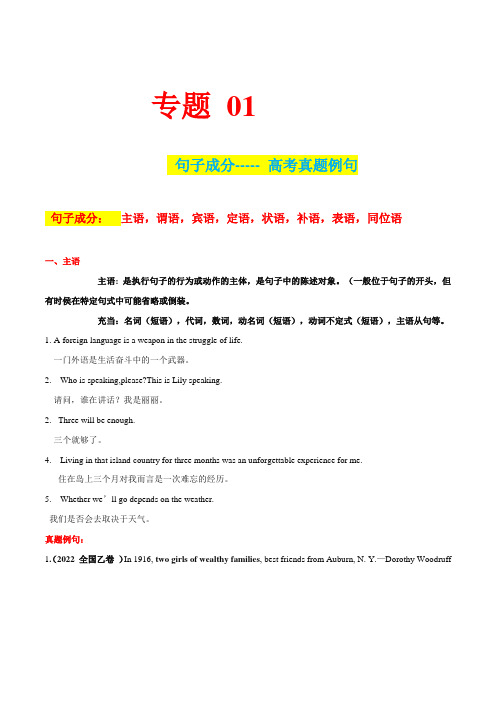
专题01句子成分----- 高考真题例句句子成分:主语,谓语,宾语,定语,状语,补语,表语,同位语一、主语主语: 是执行句子的行为或动作的主体,是句子中的陈述对象。
(一般位于句子的开头,但有时侯在特定句式中可能省略或倒装。
充当:名词(短语),代词,数词,动名词(短语),动词不定式(短语),主语从句等。
1.A foreign language is a weapon in the struggle of life.一门外语是生活奋斗中的一个武器。
2. Who is speaking,please?This is Lily speaking.请问,谁在讲话?我是丽丽。
2.Three will be enough.三个就够了。
4. Living in that island country for three months was an unforgettable experience for me.住在岛上三个月对我而言是一次难忘的经历。
5. Whether we’ll go depends on the weather.我们是否会去取决于天气。
真题例句:1.(2022 全国乙卷)In 1916, two girls of wealthy families, best friends from Auburn, N. Y.—Dorothy Woodruffand Rosamond Underwood—traveled to a settlement in the Rocky Mountains toteach in a one-room schoolhouse. (名词短语做主语)2. (2020 全国卷II满分作文)Taking part in a fruit picking activity on a farm is meaningful and rewarding. (动名词短语作主语)3.(2022 全国乙卷)By using the latest technologies, drones could also start providing higher-value services for railways, detecting faults in the rail or switches, before they can cause any safety problems.(名词短语做主语)4. (2022 全国乙卷满分作文)What benefits most to their study is reading English books.(主语从句作主语)5.(2022全国甲卷)Presenting the best of the West End along with the pick of the UK’s touring shows, the New Theatre is Cardiff’s oldest surviving traditional theatre. (名词作主语)6. (2022全国甲卷)This exhibition of some sixty masterpieces celebrating the life and work of Scotland's best loved painter, Sir Henry Raeburn, comes to London. (名词短语做主语)二、谓语谓语:是对主语动作状态或特征的陈述或说明一般在主语之后。
英语高考句子成分分析
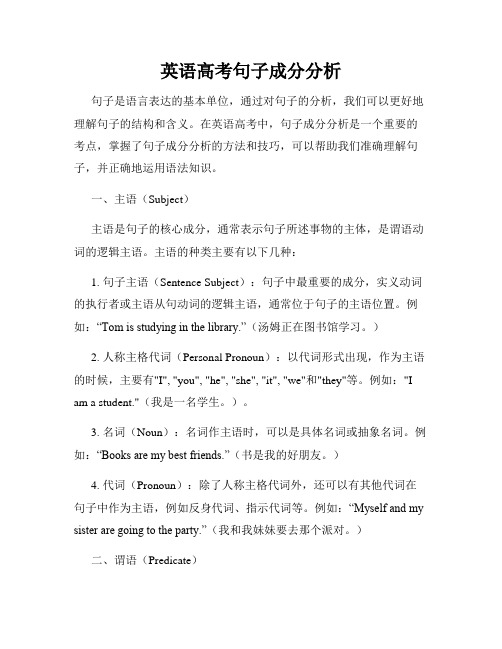
英语高考句子成分分析句子是语言表达的基本单位,通过对句子的分析,我们可以更好地理解句子的结构和含义。
在英语高考中,句子成分分析是一个重要的考点,掌握了句子成分分析的方法和技巧,可以帮助我们准确理解句子,并正确地运用语法知识。
一、主语(Subject)主语是句子的核心成分,通常表示句子所述事物的主体,是谓语动词的逻辑主语。
主语的种类主要有以下几种:1. 句子主语(Sentence Subject):句子中最重要的成分,实义动词的执行者或主语从句动词的逻辑主语,通常位于句子的主语位置。
例如:“Tom is studying in the library.”(汤姆正在图书馆学习。
)2. 人称主格代词(Personal Pronoun):以代词形式出现,作为主语的时候,主要有"I", "you", "he", "she", "it", "we"和"they"等。
例如:"I am a student."(我是一名学生。
)。
3. 名词(Noun):名词作主语时,可以是具体名词或抽象名词。
例如:“Books are my best friends.”(书是我的好朋友。
)4. 代词(Pronoun):除了人称主格代词外,还可以有其他代词在句子中作为主语,例如反身代词、指示代词等。
例如:“Myself and my sister are going to the party.”(我和我妹妹要去那个派对。
)二、谓语(Predicate)谓语是句子的另一个核心成分,表示主语的动作、状态或属性。
谓语可以由动词、形容词、副词、介词短语等构成。
1. 动词(Verb):动作类或状态类动词是常见的谓语成分,根据具体的语境和句子的时态、语态等情况,所用动词形式会有所差异。
2024届高考英语复习:句子成分课件(共74张PPT)

试卷讲评课件
例如: I happened to meet him on my way back. 我在回家的路上碰巧遇见了他。(半助动词+不定式) Passengers may not take any photo during flight. 飞行期间,旅客不得拍照。(情态动词+动词原形)
She was determined to find out who was responsible for this. 她决意弄清楚谁该对此事负责。(be+形容词+不定式) She is known to be a good teacher. 大家都称她是一位优秀教师。(动词被动式+不定式)
二、复合谓语
试卷讲评课件
复合谓语有多种结构,包括: 半助动词+不定式( appear to do, seem to do, happen to do 等); 情态动词+动词原形; be+形容词+不定式(be about to do , be determined to do, be ready to do 等); 动词被动式+不定式/现在分词/过去分词(be known to be, be found to do, be kept doing 等); used to+动词; 连系动词+表语。
Point 2、 谓语 谓语说明主语的动作或状态,也是句子的主体部分,通常由动词或短语动 词充当。谓语有人称和数的变化,可分为简单谓语和复合谓语两类。
一、简单谓语
试卷讲评课件
由一个动词或短语动词构成。 例如: The car parks operate a pay-as-you-leave system. 这些停车场按“离开时付费”的模式运作。(实义动词) Don't take on too much work-the extra cash isn't worth it. 不要太卖命了--多挣那点钱不值得。(动词短语)
高考英语句子成分

句子成分;简单句、 句子成分;简单句、 并列句和复合句
一、句子成分
• (一)句子成分的定义: 句子成分的定义:
• 构成句子的各个部分叫做句子成分。句 子成分有主要成分和次要成分;主要成 分有主语和谓语 主语和谓语;次要成分有表语、宾 主语和谓语 语、定语、状语、补足语和同位语。 We often speak English in class. One-third of the students in this class are girls.
表语
• 表语用以说明主语的身份、特征和状态, 它一般位于系动词(如be, become, get, look, grow, turn, seem等)之后。
The weather has turned cold. • The speech is exciting. His job is to teach English. •The truth is that he has never been abroad.
• (一)句子种类两种分类法 • 1、按句子的用途可分四种: 按句子的用途可分四种: • 1)陈述句(肯定、否定): is six years old; )陈述句(肯定、否定):He ): She didn’t hear of you before. • 2)疑问句(一般、特殊、选择、反意): )疑问句(一般、特殊、选择、反意): • Do they like skating? How old is he? Is he six or seven years old? Mary can swim, can’t she? • 3)祈使句:Be careful, boys; Don’t talk in class )祈使句: • 4)感叹句:How clever the boy is! )感叹句:
高考英语语法句子类型及句子成分基础知识点
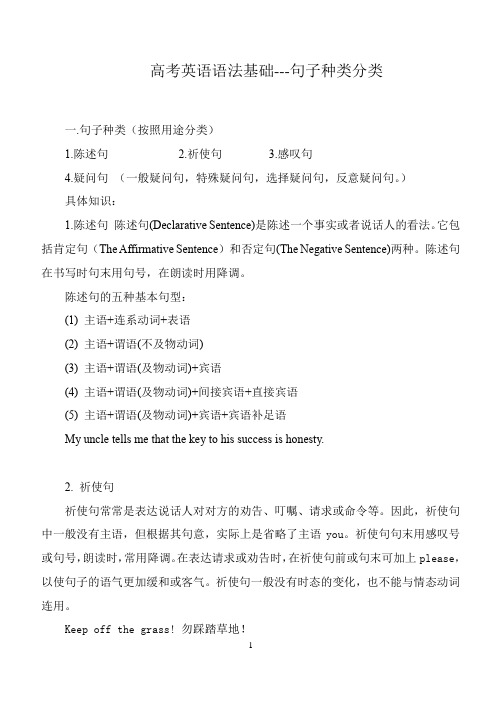
高考英语语法基础---句子种类分类一.句子种类(按照用途分类)1.陈述句2.祈使句3.感叹句4.疑问句(一般疑问句,特殊疑问句,选择疑问句,反意疑问句。
)具体知识:1.陈述句陈述句(Declarative Sentence)是陈述一个事实或者说话人的看法。
它包括肯定句(The Affirmative Sentence)和否定句(The Negative Sentence)两种。
陈述句在书写时句末用句号,在朗读时用降调。
陈述句的五种基本句型:(1) 主语+连系动词+表语(2) 主语+谓语(不及物动词)(3) 主语+谓语(及物动词)+宾语(4) 主语+谓语(及物动词)+间接宾语+直接宾语(5) 主语+谓语(及物动词)+宾语+宾语补足语My uncle tells me that the key to his success is honesty.2. 祈使句祈使句常常是表达说话人对对方的劝告、叮嘱、请求或命令等。
因此,祈使句中一般没有主语,但根据其句意,实际上是省略了主语you。
祈使句句末用感叹号或句号,朗读时,常用降调。
在表达请求或劝告时,在祈使句前或句末可加上please,以使句子的语气更加缓和或客气。
祈使句一般没有时态的变化,也不能与情态动词连用。
Keep off the grass! 勿踩踏草地!Always keep in mind that your main task is to get this company running smoothly.3. 感叹句感叹句的基本构成形式1).What(+a/an)+形容词+名词+主语+谓语!2).How+形容词+a/an+可数名词单数+主语+谓语!3).How+形容词/副词+主语+谓语!You can't imagine how crucial a role the pigeons played in the battlefields.你无法想象在过去的战场山鸽子发挥了多么重要的作用。
- 1、下载文档前请自行甄别文档内容的完整性,平台不提供额外的编辑、内容补充、找答案等附加服务。
- 2、"仅部分预览"的文档,不可在线预览部分如存在完整性等问题,可反馈申请退款(可完整预览的文档不适用该条件!)。
- 3、如文档侵犯您的权益,请联系客服反馈,我们会尽快为您处理(人工客服工作时间:9:00-18:30)。
Part1英语句子成分一、词类英语词类分十种:名词、形容词、代词、数词、冠词、动词、副词、介词、连词、感叹词。
1、名词(n.):表示人、事物、地点或抽象概念的名称。
如:boy, morning, bag, ball, class, orange.2、代词(pron.):主要用来代替名词。
如:who, she, you, it .3、形容词(adj..):表示人或事物的性质或特征。
如:good, right, white, orange .4、数词(num.):表示数目或事物的顺序。
如:one, two, three, first, second, third, fourth.5、动词(v.):表示动作或状态。
如:am, is,are,have,see .6、副词(adv.):修饰动词、形容词或其他副词,说明时间、地点、程度等。
如:now, very,here, often, quietly, slowly.7、冠词(art..):用在名词前,帮助说明名词。
如:a, an, the.8、介词(prep.):表示它后面的名词或代词与其他句子成分的关系。
如in, on, from, above, behind.9、连词(conj.):用来连接词、短语或句子。
如and, but, before .10、感叹词(interj..)表示喜、怒、哀、乐等感情。
如:oh, well, hi, hello.二、句子成分1.主语:是句子要说明的人或事物,是句子的主体,一般由名词、代词、数词、不定式或动名词等充当。
如:The car is running fast. / The girl can sing many English songs.(名词)We are students. / This is my pen . Yours is on the desk.(代词)One of my classmates is from Shanghai. / Two and three is five.(数词)The blind need more help.(名词化的形容词)It's bad manners to spit in public. (不定式)Eating too much is bad for your health.(动名词)【注意】若不定式短语作主语常用it作形式主语,而把真正的主语(不定式短语)放在句后。
练一练:指出下例句中主语的中心词。
① The teacher with two of his students is walking into the classroom.② There is an old man coming here.③ The useful dictionary was given by my mother last year.④ To do today's homework without the teacher's help is very difficult.2.谓语:说明主语的动作或状态,也是句子的主体部分,一般由动词充当。
动词分为实义动词、连系动词、情态动词和助动词。
实义动词单独作谓语,连系动词与表语一起构成谓语,情态动词与省略to的不定式构成合成谓语,助动词与动词原形共同构成谓语部分。
如:由单一动词作谓语:We are Chinese. / He has an English- Chinese dictionary.情态动词加主要动词:We can play the piano. / You must see the doctor.助动词加主要动词构成谓语:She is talking with her sister. / I have seen this man before. 【注意】谓语与主语在人称与数方面要相互照应。
练一练:选出句中谓语的中心词。
① I don't like the picture on the wall.A. don'tB. likeC. pictureD. wall② The days get longer and longer when summer comes.A. getB. longerC. daysD. summer③ Do you usually go to school by bus?A. DoB. usuallyC.goD. bus④ There will be a meeting at the library this afternoon.A. will beB. meetingC. the libraryD. afternoon⑤ Did the twins have porridge for their breakfast?A.DidB. twinsC. haveD. breakfast⑥ Tom didn't do his homework yesterday.A. TomB. didn'tC. doD. his homework⑦ What I want to tell you is this.A. wantB. to tellC. youD. is⑧ We had better send for a doctor.A. WeB. hadC. sendD. doctor3.表语:用于说明主语的身份、特征或感受,一般由名词、数词、形容词、分词等充当。
常用的连系动词有:be,look,get,sound(听起来),feel,become,smell,turn,taste(尝起来)等。
如:They are workers.(名词)Two and three is five.(数词)The story is very interesting.(形容词)M y job is teaching English.(动名词)She is at home.(介词短语)I feel terrible.(形容词)The dish tastes delicious.(形容词)He is here (副词)It’s getting dark./ He got very angry. / The hill has turned green. (形容词)Be动词(am,is,are, was, were)表保持(keep, stay)系动词表改变(get,become,turn)感官动词(feel,sound,seem/look,taste,smell)练一练:挑出下列句中的表语。
① The old man was feeling very tired.② Why is he worried about Jim?③ The leaves have turned yellow.④ Soon They all became interested in the subject.⑤ She was the first to learn about it.4.宾语:是及物动词所涉及的对象,是动作的对象或承受者。
一般由名词、代词、不定式及动名词等充当。
如:He is doing his homework. / I saw a plane in the sky just now. (名词)They did nothing this morning. / I met him on my way home.(代词)I want three./ Please pass me the first. (数词)She wants to go home.(不定式)We enjoy playing football.(动名词)【注意】①有的动词可接双宾语,间接宾语指人,直接宾语指物。
这类动词常见的有:give,buy,lend,pass,tell,leave等。
如:He bought me a book.Pass me the ball,will you?(间宾+直宾)直接宾语一般放在间接宾语之后,但若把直接宾语放在前面,则要在间接宾语前加适当的介词如to或for等。
如:Han Chen lent some money to Tom.(直宾+间宾)Lucy bought a dictionary for Tom.(直宾+间宾)②有的动词常用不定式作宾语,而不能用动名词。
这类动词有:want,wish,hope,promise,decide,agree,choose,care等。
如:I hope to see you again.③有的动词一般只用动名词作宾语,而不用不定式。
这类动词有:enjoy,finish,mind,practise,miss,suggest,keep(on)等。
如:Do you mind my opening the window?④有的动词后接不定式与动名词含义不同。
a)forget to do表示“未发生的动作”,forget doing表示“已完成的动作”。
如:Don't forget to come here earlier tomorrow.(还没来)I forgot returning the book to him.(书已还给他了)b)stop to do(不定式为状语)表示“停下原来的事,去做另一件事”,stop doing表示“停止做某事”。
如:I stopped to talk with him.(我停下来与他谈话。
)The students stopped talking when the teacher came in.(老师进来时学生们停止谈话。
注意:英语中带有宾语的谓语动词叫及物动词,不带宾语的叫不及物动词。
及物动词后必须跟上宾语意义才完整,不及物动词本身意义已完整,后面不跟宾语。
You may use my pen. / Do you like fish? ( 及物)Dick swims very well. / The sun rises in the east. (不及物)不及物动词可加介词再加宾语We are listening to the music.They are talking to each other.既可以作及物动词又可以作不及物动词的词:We are growing tomatoes. / Tomatoes grow well in our garden.They left Shanghai yesterday. / They left yesterday.My mother teaches in this school. / She teaches English.We are studying. / We study English.We began our lesson at nine. / The lecture began at nine.练一练:挑出下列句中的宾语。
